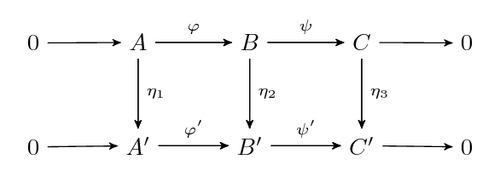http://texblog.net/latex-archive/maths/pgf-tikz-commutative-diagram/
The chains library is very useful for writing exact sequences. Yet there's no feature for labeling the edges of a chain. Besides arrows, we might need to write symbols for maps over, under, or just next to it.
This example shows a way by modifying the join method of the chains library. Its original syntax is join=with<node> by <options>, here the syntax is changed to join={node[options] {label}}.
Furthermore, we define a style for the labels, so that all are in math mode and typeset in scriptstyle.

Edit and compile if you like:
% TikZ chains with labeled edges
% Author: Stefan Kottwitz , http://texblog.net
\documentclass[a4paper,10pt]{article}
\usepackage{tikz}
\usepackage[active,tightpage]{preview}
\PreviewEnvironment{tikzpicture}
\setlength\PreviewBorder{5pt}%
\usetikzlibrary{arrows,chains,matrix,positioning,scopes}
%
\makeatletter
\tikzset{join/.code=\tikzset{after node path={%
\ifx\tikzchainprevious\pgfutil@empty\else(\tikzchainprevious)%
edge[every join]#1(\tikzchaincurrent)\fi}}}
\makeatother
%
\tikzset{>=stealth',every on chain/.append style={join},
every join/.style={->}}
\tikzstyle{labeled}=[execute at begin node=$\scriptstyle,
execute at end node=$]
%
\begin{document}
\begin{tikzpicture}
\matrix (m) [matrix of math nodes, row sep=3em, column sep=3em]
{ 0 & A & B & C & 0 \\
0 & A' & B' & C' & 0 \\ };
{ [start chain] \chainin (m-1-1);
\chainin (m-1-2);
{ [start branch=A] \chainin (m-2-2)
[join={node[right,labeled] {\eta_1}}];}
\chainin (m-1-3) [join={node[above,labeled] {\varphi}}];
{ [start branch=B] \chainin (m-2-3)
[join={node[right,labeled] {\eta_2}}];}
\chainin (m-1-4) [join={node[above,labeled] {\psi}}];
{ [start branch=C] \chainin (m-2-4)
[join={node[right,labeled] {\eta_3}}];}
\chainin (m-1-5); }
{ [start chain] \chainin (m-2-1);
\chainin (m-2-2);
\chainin (m-2-3) [join={node[above,labeled] {\varphi'}}];
\chainin (m-2-4) [join={node[above,labeled] {\psi'}}];
\chainin (m-2-5); }
\end{tikzpicture}
\end{document}
Click to download: labeled-chain.tex • labeled-chain.pdf
Open in Overleaf: labeled-chain.tex


